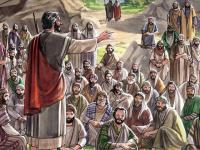
Luke’s account of the beatitudes differs from that of Matthew, in that in Matthew's gospel Jesus preaches from a mountain, which signifies the nearness of God (Matthew:13-16). Moses received the Ten Commandments on Mount Sinai; now Jesus is showing his audience what the meaning of the Law really is. Luke takes a different approach: Jesus comes down to a piece of level ground. Some prophets used the word “level” to to convey a sense of deprivation, hardship and hunger. There could be also the sense that Jesus, God Incarnate, is joining his people on an equal basis. This is of course what he did in becoming man.
The Law had been a means of bringing order into Jewish society and distinguishing them as the Chosen People, set apart by God. However, the Law had become a set of observances which could often supersede human kindness. The commandment that no work was to be done on the Sabbath, was meant to provide labouring people with a day to relax and enjoy themselves, rather than to strangle them with a plethora of things that they could not do.
Jesus was teaching that the Kingdom of God was a place where everyone had a decent living and the marginalised were taken care of. He did not mean that poverty and hunger were to be encouraged. The Beatitudes have a real relevance at the moment, when some of those who are wealthy exert their power to crush the weak and the suffering for their own benefit, rather than alleviate their misery. We pray for a world where the Beatitudes become a reality.